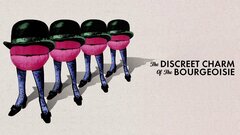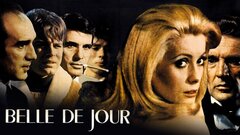One of the founders of surrealist cinema, Luis Bunuel enjoyed a career as diverse and contradictory as his films: he was a master of both silent and sound cinema, of documentaries as well as features; his greatest work was produced in the two decades after his 60th year; and although frequently characterized as a surrealist, many of his films were dramas and farces in the realist or neo-realist mode. Yet despite all the innovations and permutations of his work, Bunuel remained surprisingly consistent in the targets of his social satire: the Catholic Church, bourgeois culture, and Fascism. As he once commented, "Religious education and Surrealism have marked me for life."
Bunuel described his childhood in Calanda, a village in the Spanish province of Aragon, as having "slipped by in an almost medieval atmosphere." Between the ages of six and fifteen he attended Jesuit school, where a strict educational program, unchanged since the 18th century, instilled in him a lifelong rebellion against religion. In 1917 Bunuel enrolled in the University of Madrid and soon became involved in the political and literary penas, or clubs, that met in the city's cafes. His friends included several of Spain's future great artists and writers, including Salvador Dali, Federico Garcia Lorca and Rafael Albertini.
Within a few years the avant-garde movement had reached the penas and spawned its Spanish variants, "creacionismo" and "ultraismo." Although influenced by these, Bunuel was often critical of the Spanish avant-garde for its allegiance to traditional forms. In 1925 Bunuel left Madrid for Paris, with no clear idea of what he would do. When he saw Fritz Lang's "Destiny" (1921), however, he realized where his vocation lay. He approached the renowned French director, Jean Epstein, who hired him as an assistant. Bunuel began to learn the techniques of filmmaking but was fired when he refused to work with Epstein's own mentor, Abel Gance, whose films he did not like. In a prophetic statement, Epstein warned Bunuel about his "surrealistic tendencies."
In 1928, with financial support from his mother, Bunuel collaborated with Dali on "Un Chien Andalou," a "surrealist weapon" designed to shock the bourgeois as well as criticize the avant-garde. As in his earlier book of poems, "Un Perro Andaluz," Bunuel rejected the avant-garde's emphasis on form, or camera "tricks," over content. Instead, his influences were commercial neo-realism, horror films and American comedies. Bunuel's three early films established him as a master of surrealist cinema, whose goal was to treat all human experience--dreams, madness or "normal" waking states--on the same level. The critical success in some quarters of the strange and provocative "L'Age d'or" (1930) secured Bunuel a contract with MGM, which he turned down after a visit to Hollywood in 1930.
His next film, "Las Hurdes: Tierra Sin Pan" (1932) was a documentary financed with money won in a lottery and shot with a camera borrowed from Yves Allegret. Ostensibly an objective study of a remote, impoverished region in western Spain, the film constituted such a militant critique of both church and state that it was banned in Spain. The stage had been set, however, for Bunuel's later work, in which realism--with its pre-established mass appeal--provided an accessible context for his surreal aesthetic and moral code. After "Las Hurdes," Bunuel would not direct another film until 1947.
Although still critical of commercial cinema, he spent the next 14 years within the industry, learning all aspects of film production. From 1933 to 1935 he dubbed dialogue for Paramount in Paris and then Warner Bros. in Spain; between 1935 and the outbreak of the Spanish Civil War in 1936 he produced popular musical comedies in Spain; during the Civil War he served the Republican government, compiling newsreel material into a documentary about the war, "Espana leal en armas" (1937). In 1938, while he was in Hollywood supervising two other documentaries, the Fascists assumed power at home. Unable to return to Spain, Bunuel went to work for the Museum of Modern Art in New York, re-editing and dubbing documentaries for distribution in Latin America.
He was forced to resign in 1942, however, because of his suspected Communist background--a suspicion which he later claimed had been aroused by Dali. In order to survive, Bunuel narrated documentaries for the Army Corps of Engineers until 1944, when Warner Bros. hired him to produce Spanish versions of their films. In 1946 Bunuel moved to Mexico, where many of Spain's intellectuals and artists had emigrated after the Civil War. He would live there for the rest of his life, becoming a citizen in 1949 and directing 20 films by 1964.
This period is often described as an "apprenticeship" in which Bunuel was forced to shoot low-budget commercial films in between a handful of surreal "classics." Indeed, Bunuel's supposed indifference to style--his minimal use of non-diegetic music, close-ups or camera movement--is often judged to be largely the result of the limited resources available to him. Yet his Mexican films can more accurately be seen as a refinement of the often unobtrusive aesthetic style that had been evident since "Un Chien Andalou." As Bunuel himself insisted, "I never made a single scene that compromised my convictions or my personal morality."
Bunuel's third Mexican film, "Los Olvidados" (1950), brought him to international attention once again. Although hailed as a surrealist film, it owes much to postwar neorealism in its unsentimental depiction of Mexico's slum children. As in his other Mexican films before "Nazarin" (1958), dream sequences and surreal images are introduced at strategic moments into an otherwise realist narrative. (Contributing to the relative neglect of these films has been their unavailability outside Mexico, and perhaps their proletarian and "ethnic" focus.)
In 1955 Bunuel began to direct international--and more openly political--co-productions in Europe. In 1961 he was invited to Spain to film "Viridiana." The completed film was a direct assault on Spanish Catholicism and Fascism and was banned by its unwitting patron; a "succes de scandale," it won the Palm d'Or at Cannes and secured long overdue international acclaim for its director.
After "Viridiana," Bunuel worked mostly in France. The growth of his new international (and consequently educated and middle-class) audience coincided with his return to a surrealist aesthetic. "The Exterminating Angel" (1962), "The Discreet Charm of the Bourgeoisie" (1972) and "The Phantom of Liberty" (1974) depict a bourgeoisie trapped within their own conventions, if not--in the first film's metaphorical conceit--their own homes. "Belle de jour" (1967), "Tristana" (1970) and "That Obscure Object of Desire" (1977) explore sexual obsessions and preoccupations. "The Milky Way" (1969) launches a frontal assault on the Church, in a summation of Bunuel's lifelong contempt for that institution.
In 1980, Bunuel collaborated with Jean-Claude Carriere, his screenwriter since "Diary of a Chambermaid" (1963), on his autobiography, "My Last Sigh" (France 1982; USA 1983).






















































































